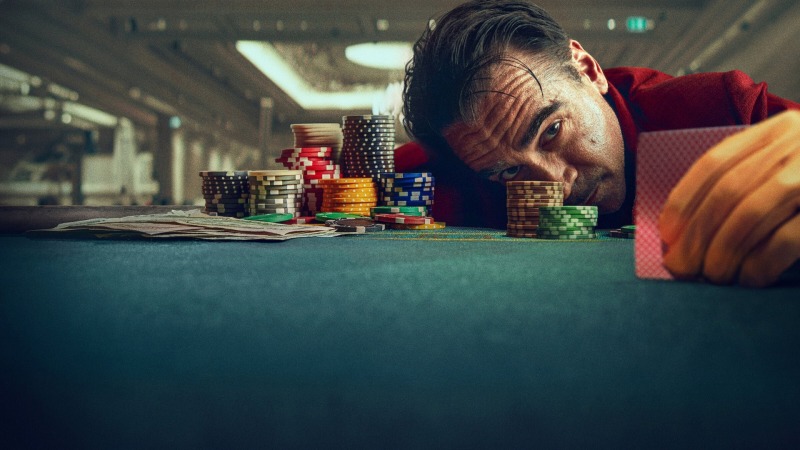Colin Farrell Bets the House He Doesn’t Have in Ballad of a Small Player

If gambling is, for many people, an addiction, then it makes a certain amount of sense to produce a gambling movie that has all the garish, cranked-up, super-saturated style of a cinematic drug trip. That’s the big visual idea animating – and, when it hits narrative dead-ends, reanimating – Edward Berger’s Ballad of a Small Player, a gambling drama that looks like few others. (“Looks like few others” is practically its own triumph in the field of movies receiving a token theatrical release before they roll out on Netflix.) Lord Doyle (Colin Farrell), the degenerate gambler at the movie’s center, is operating under a grandiose assumed name, and his flimsy deceptions don’t end there. By relocating to neon-radiated Macau, a short boat ride from a Hong Kong that seems to no longer welcome him and a significantly longer jaunt from his European creditors, Doyle has willed himself into a fever dream of self-destruction. He knows in the abstract that there may be consequences coming, but he’s also, in a sense, playing with illicitly borrowed house money, forestalling the inevitable collection.
That’s probably why Doyle’s posh hotel accommodations and elaborate self-costuming in brightly colored suits, the whole fact of his day-to-day existence, doesn’t seem entirely real, despite the vividness of Berger’s location shooting. Doyle’s life essentially isn’t real; he lives in a purgatory that can resemble heaven or hell, depending on whether he’s up or down. Mostly, from what we can see, down; his preferred game is baccarat, which at least lends his deep-end jaunts some focus. If all card games involve some measure of luck alongside whatever strategy, baccarat seems particularly unforgiving, though maybe that’s just how Doyle plays it. Berger emphasizes the visceral physicality of his gambler: the squeak of the leather gloves Doyle wears to the tables as they bend for a peek at the cards he’s been dealt, the incidental noises from his mouth. When he joylessly gorges on hotel food in some mysterious gesture of defiant largesse, Farrell’s performance turns downright grotesque.
Farrell is good in a movie that may ultimately ask too much of him. He’s not soloing the entire time; one of his several scene partners includes Tilda Swinton as a detective (like Doyle, operating under an assumed name) hired to track down Doyle and retrieve the astronomical sum he owes back in Britain. He also has an interlude with money-lender Dao Ming (Fala Chen). This may be Farrell’s greatest strategic advantage in this role: He is charming enough, slipping between a would-be upper-crust English accent and his own Irish lilt, to believe that maybe, just maybe, these women would stop and talk to him, rather than lead whoever else is looking for him straight to his doorstep. Then again, maybe Doyle’s true advantage is that he doesn’t have a doorstep; the detective has found him despite his apparent faking of his own death back home.
-

-

-

-

-

-

-

-

-

-

-

-

-

-

-

-

-

-

-

-

-

-

-

-

-

-

-

-

-

-

-

-

-

-

-

-

-

-

-

-








































